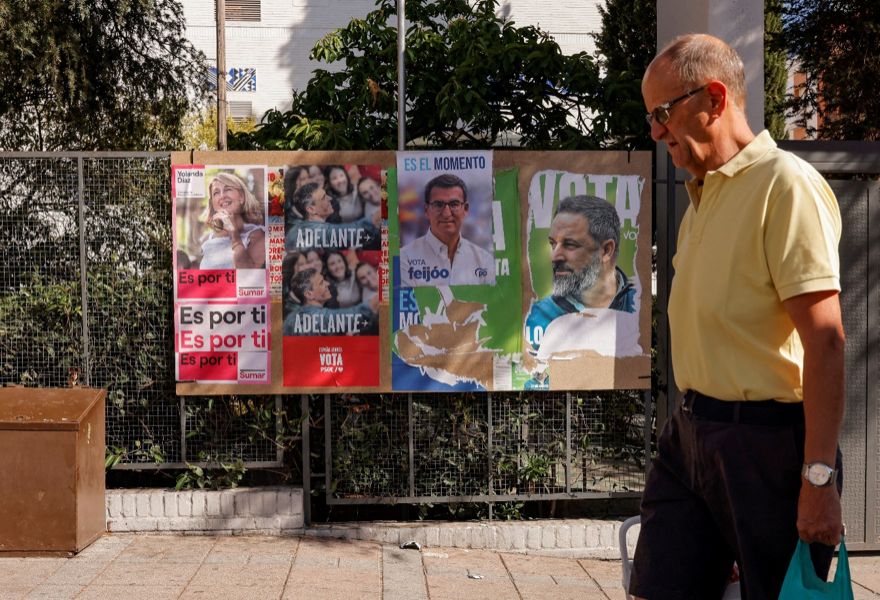‘On July 23rd, Spaniards headed to the polls to elect a new government. After disappointing results for his party in the local elections, Prime Minister Pedro Sánchez decided to call these snap elections. So, let’s take a look at the different parties running, as we ask who they are likely to enter a coalition with, and what the results could mean for the foreseeable future.
Partido Socialista Obrero Español (PSOE)
The largest party ahead of these elections, PSOE is the party of incumbent Prime Minister Pedro Sánchez. The party’s name translates to the ‘Spanish Socialist Workers’ Party’ and it was founded during the 1800s as the political wing of the trade union movement. Having constituted a large contingent of the republican forces during the Spanish Civil War, PSOE has spent the longest time in government of any party in the post-dictatorship era. Like most socialist parties in Europe, it has subscribed to a centre-left, pro-European outlook, but under the leadership of Pedro Sánchez has now shifted to the left, with Sánchez preferring to enter into coalition with the radical left than more moderate or centre/right-wing forces.
Sánchez has been Prime Minister since 2018. Under his government, Spain has witnessed numerous reforms, including a comprehensive labour law to improve working conditions, efforts to advance the rights of women, and those of the LGBTQ+ community, including the introduction of the “Trans Law”, updating the country’s gender recognition system to recognise self ID, allowing people to declare their gender without a medical diagnosis of dysphoria. Spain’s economy has also suffered less than most other European countries in recent years, with inflation being only 1.9% in 2023, compared to 7.9% in the UK!
Sánchez made the 2023 election a battle between the left and right, highlighting PSOE’s conservative opponents, the People’s Party’s, willingness to work with the far-right Vox, and campaigning under the motto ‘Adelante’, meaning ‘onwards’.
Partido Popular (PP)
The centre-right party in Spain, the People’s Party has traditionally been the party of low taxes, Spanish unionism and economic liberalism. The People’s Party had been the strong favourites entering into this election, capitalising off of a widespread desire for lower taxes, and a reaction against separatist parties, most polls showed the PP and their allies, Vox, winning an outright majority. Led by a veteran civil servant and former president of the region of Galicia, Alberto Núñez Feijóo, seen as a moderate within the party, the PP had been picking up victories in local elections, including a majority in the PSOE stronghold of Andalusia in the May local elections.
Feijóo continued his party’s policy of allying with far-right Vox, and during his campaign, attempted to balance the right-wing tendencies within his party, campaigning on culture war issues such as trans rights, with the moderates within the party, presenting himself as the middle ground between the so-called “radical” government of Pedro Sánchez and the far-right.
Vox
A far-right party often described as racist, sexist and homophobic, Vox has been a highly controversial party since its entrance to parliament in 2019. From its policies of repealing abortion and gender equality laws, expelling Muslims from Spain and its leaders’ habit of quoting fascist politicians to its support of gun ownership and support for Hungary’s Victor Orbán, Vox also heavily opposes the autonomous communities’ independence, and is in favour of the abolition of region’s parliaments.
Vox campaigned to improve its results from the 2019 elections, when it came third, and relied on the fact that the PP would likely need to enter government with them in order to gain a majority. Vox campaigned heavily on culture war issues, specifically against the expansion of LGBTQ+ rights.
Sumar
Sumar, meaning ‘unite’, was an electoral list comprising various radical-left parties. The three largest components were the left-populist Podemos (‘we can’), the communist party of Spain who had both been junior partners in Sánchez’s government, and the eco-socialist Más País, (‘more country). Formed by Deputy Prime Minister and Labour Minister Yolanda Díaz, Sumar claimed it was the behind the radical reformism of the incumbent government, as the labour law was Díaz’s brainchild, and the trans law was brought forward by Podemos’ Equality Minister Irene Montero.
Díaz campaigned on furthering the reforms of the PSOE government. Her main policy point was the introduction of a £20,000 ‘national inheritance’ fund, giving everyone in Spain £20,000 when they turn 18 to fund their education or start a business, an idea supported by world-renowned economist Thomas Piketty. Díaz promised that if the government were to be re-elected, there would be “more rights for women, more rights for LGBT people and more rights for workers”.

Election results
Despite the polls suggesting the right would win an outright majority, election night did not reflect this. PP massively increased their vote share, but at the expense of their right-wing allies. PSOE lost its footing in its traditional Southern strongholds, but made gains in Catalonia and the Basque country, making increases on its 2019 results. Vox lost 20 of its 52 seats and Sumar, as a new formation, entered parliament with 31 seats.
However, Spain is now faced with a hung parliament, with no clear path to victory for either Feijóo or Sánchez, whose parties won 33% and 32% of the votes respectively. Despite having fewer seats, Sánchez has a clearer path to a majority than Feijóo, as he can rely on the votes of the progressive Catalan, Basque and Galician nationalist parties, who would be desperate to prevent the anti-independence Vox from entering government. However, even with the help of these progressive nationalist parties, PSOE and Sumar still don’t have a majority. To gain one, they would need the support of centre-right Catalan nationalist party, Junts (‘together’), whose condition is a commitment from Sánchez to hold a Catalan independence referendum, which is illegal under Spanish law.
And so, the most likely path from these elections is as follows: King Felipe will ask Sánchez to attempt to form a government, as his path to a majority is clearer than that of Feijóo. Either Sánchez will be able to talk Junts down from a referendum to something vaguer, thus securing their support, or new elections will be held. If this was the case, the left will be the favourites to win, as the shock of not gaining a majority has caused internal crises in the People’s Party, and Vox has started blaming them for Vox’s lost seat. Meanwhile, Sumar and PSOE appear to be strong and united.’
Joel Nugent just graduated after studying for his BA (Hons) in Politics and International Relations.


